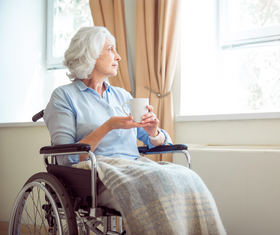
6 Ways to Convince Elderly Parents to Use Canes and Walkers
As our parents' age, ensuring their safety and comfort becomes increasingly important. One of the critical aspects of maintaining their independence and mobility is using walking aids such as canes and walkers. However, convincing elderly parents to use these aids can be challenging.
In this blog post, we will see how to help your elderly parents embrace canes and walkers to maintain their quality of life and prevent falls and injuries.
1. Educate Them on the Benefits
The initial step in convincing elderly parents to use walking aids is to educate them on the benefits these devices provide. Discuss the increased stability, improved balance, and reduced stress on joints that canes and walkers offer.
Emphasise that using walking aids with wheels can prevent falls and injuries, which can ultimately help them maintain their independence and continue to participate in the activities they enjoy. Share stories and testimonials of other elderly who have successfully embraced the use of walking stick wheels to improve their quality of life.
2. Address Their Concerns
It is essential to address any concerns your elderly parents may have about using walking aids. Common problems include feeling embarrassed, dependent, or that using a walking aid signifies losing independence.
Reassure them that using a cane or walker is a sign of strength and wisdom by prioritising their safety and well-being. Remind them that many people of all ages use walking aids, like an aluminium rollator walker, for various reasons, and there is no shame in taking steps to stay healthy and active.
3. Involve Their Healthcare Team
Involving your elderly parents' healthcare team in the discussion can provide valuable insights and professional recommendations. Their doctor, physical therapist, or occupational therapist can assess their mobility needs and recommend the appropriate walking aid.
Having the support and advice of healthcare professionals can help alleviate any concerns your elderly parents may have and make them more open to the idea of utilising a cane or walker.
4. Choose the Right Walking Aid
Various types of canes and walkers are designed to cater to different mobility needs and preferences. Take the time to research and find the right walking aid that best suits your elderly parent's needs.
Consider factors including comfort, ease of use, weight capacity, and adjustability. Also, consider the aesthetics of the walking aid – choosing a cane or walker that matches their style or preferences can make it more appealing to them.
You can see a huge range of walking aids in our walking aid collection.

5. Make It a Gradual Transition
Introducing a walking aid to your elderly parent's daily routine can be a significant change. Consider starting with a cane before progressing to a walker to make the transition smoother.
Encourage them to use the walking aid around the house or on short walks outside to help them become more comfortable and confident with the device. Gradually increase the use of the walking aid in more challenging situations such as longer walks, crowded spaces, or uneven terrain.
6. Offer Your Support and Encouragement
Finally, providing your elderly parents with emotional support and encouragement is essential throughout the process. Acknowledge their feelings and concerns while emphasising the benefits of using a walking aid.
Offer help finding the right walking aid, adjusting it to their needs, and practising using it in different settings. Praise their progress and remind them they are taking steps to maintain their independence and quality of life.
Conclusion
Convincing elderly parents to embrace the use of canes and walkers can be challenging, but it is crucial for their safety and well-being. By educating them on the benefits, addressing their concerns, involving their healthcare team, choosing the right walking aid, making it a gradual transition, and offering your support and encouragement, you can help your elderly parents adapt to using walking aids and maintain their independence and mobility.




